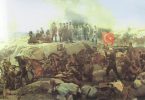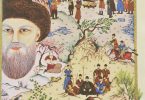Abdülhak Şinasi, son of Mister Mahmud Celalettin who published ‘Hazine-i Evrak’ and ‘İnsaniyet’ magazines… His name is given after two giants of Turkish literature, Abdülhak Hamid and İbrahim Şinasi, and his father’s admiration to both these figures. ‘Hazine-i Evrak’ is the first Turkish literary magazine. Most reputed names of the period published their pieces, poems, reviews in this magazine. Among these names are Nâmık Kemal, Abdülhak Hamid, Ziya Paşa, Recaizade Mahmud Ekrem, Halid Ziya, Nâbizâde Nâzım and Menemenlizâde Mehmed Tahir.
Abdülhak Şinasi Hisar was born in his grandfather Mister Muhtar’s seaside mansion at Rumelihisarı in 1888. He was the son of an aristocratic family just like his mother. However the period he was born in, remarks the gradual fading of an empire from the scene, and consequently Empire’s aristocracy. His life, memories and his works become more meaningful from this perspective. His father had received education in Paris for some time which was very important and a privilege at that period, and also a prominent intellectual of his time. Both an aristocrat and an intellectual… Hisar’s mother was also from an aristocratic family. He spent his childhood in the seaside mansion in Rumelihisarı, in villas in Çamlıca and Büyükada in parallel with the economic and social status of his family.
Bosphorus… Where Ottoman aristocracy and culture materialize. Seaside mansions were environments where language of the Empire was spoken, art was survived, courtesy, etiquette and manners, tastes were conveyed to following generations. He is one of the last agents of this grand legacy. He witnessed the passing away of the Empire and everything it represented. Some of his works are in a sense a farewell and an elegy to happy days, eras. This is why he is an exceptional writer who achieved to trail other concepts alongside his name. We think of “nostalgia” when his name is mentioned. More than and within it, Istanbul… Next to his name usually writes “Istanbul nostalgia” or “old Istanbul” and this is not regarded odd at all. Then the term “memory” follows with all its associations. It is possible to separately add the words “past” and “time” to it; or the phrase “past time”. But there is another word encircling all these: blues. This is the blues of saying goodbye, losing, downfall.
He gets acquainted with literature, art, poetry and fine emotions inspired by poetry at young age. He is raised by nannies, tutors, foremen both in the seaside mansion in Rumelihisarı and villas in Çamlıca and Büyükada. His childhood passes in a constant fairy tale atmosphere as if it would last forever. He often returns to these days in his future works, even continuously mentions them. Perhaps this way he was trying to ease the pain of reality that those days were gone. He was aware that he could only bear the heavy weight of reality with the help of art. Because art whispered him that time is an uninterrupted process. This is what brings him together with Marcel Proust. Time is constant and what we call past is actually hidden in “now”. For this reason his nostalgia is not an aimless, purposeless nostalgia.
There is no doubt that Abdülhak Şinasi Hisar is a great stylist. He narrates object and time with a great rigor and in amazing detail. He is ironic when narrating events and people. Is that really the case? This is a hesitant irony. For instance in ‘Mister Samih and Us’, it is as if the writer appeals to irony. However we cannot deny that this is a sentimental mercy. It is very difficult to distinguish irony and drama, even melancholy in his novels. His characters are from his circle, Ottoman aristocracy. Their living conditions are negatively affected with the decline of the Ottoman. What they experience is entirely a downfall. They have a hard time adapting to the new life style. This makes them caricatures. However this caricature is not always amusing. There is a side of it that saddens, hurts. In fact what they experienced are funny by themselves. But the essay style dominating Abdülhak Şinasi’s narration and his content, transforms comedy into drama, even tragedy. This is why we cannot laugh at Mister Samih’s situation.
In all his three novels, either in ‘Our Brother-in-Law at Çamlıca’ or ‘Mister Samih and Us’ or ‘Europeanism and Sheikhdom of Mister Ali Nizami’, we come across the style of ‘Bosphorus Moonlights and Bosphorus Seaside Mansions’. He cannot escape from essay form in his novels, perhaps he does not desire to. What his characters go through have limited place in his novels. If you remove the short incidents, it is possible to read all these three novels as essays. Here he traces a civilization which has passed with all details of objects. More correctly, he efforts to convey these traces to next generations. These texts proclaim how our lives have grown poor, and ordinary. Abdülhak Şinasi Hisar is one of those who did not find it in his heart. He is from the last generation who got to perceive and experience Istanbul and the civilization there, as a whole. He never abandoned living in that civilization in his life throughout the Republic of Turkey period. In a sense, he tried to record our cultural heritage in his works. He wanted to guard these with his works. He was one of the last guardians of our civilization.









Leave a Comment